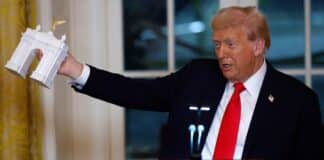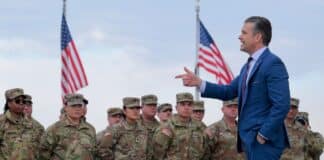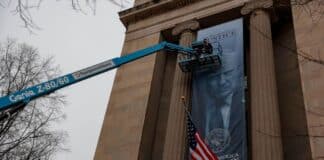President Trump told U.S. troops aboard the USS George Washington in Yokosuka, Japan, that interdiction operations in the Caribbean have been so effective “we can’t find a ship” loaded with drugs anymore. The president credited Pete Hegseth — introduced by administration aides as “Secretary of War” — for leading aggressive military action that has destroyed trafficker vessels and crippled maritime smuggling routes.
The speech reiterated a hardline posture toward transnational criminal networks. “Those drug ships aren’t coming in anymore. We can’t find a ship,” President Trump said, adding praise for Hegseth’s role and sacrifice. The renaming of Hegseth’s title signaled a broader administration embrace of more forceful rhetoric and tactics in confronting the flow of narcotics.
Operations ordered by the White House began in September. The campaign culminated recently in the largest single strike to date: three separate airstrikes that destroyed four vessels off the Pacific coast of Colombia. Officials reported 14 suspected narco‑terrorists killed and one survivor rescued and turned over to Mexican authorities after a joint search effort. Since September, U.S. strikes have reportedly destroyed at least 14 boats, producing roughly 57 casualties across operations in the Caribbean and Eastern Pacific.
Pete Hegseth framed the campaign as defensive and urgent. “The Department has spent over TWO DECADES defending other homelands. Now, we’re defending our own,” he said, vowing to “track,” “network,” and “hunt and kill” narco‑terrorists who reportedly have been responsible for large numbers of American deaths. The administration argued that kinetic strikes at sea, conducted in international waters, have disrupted supply chains and hindered cartel operations that fuel addiction and violence at home.
Critics decried the tactic. Sen. Chris Van Hollen (D‑Md.) labeled the strikes “illegal” and “extrajudicial killings,” urging arrests and upstream targeting of cartel leadership rather than battlefield eliminations at sea. Republicans and administration supporters countered that conventional law‑enforcement approaches had failed to stop the flow of deadly narcotics and that military action was necessary to protect American communities.
The episode illustrates a stark policy divide: one side advocating expanded use of force to choke smuggling routes and save lives, the other warning about legality, oversight, and the diplomatic ramifications of maritime strikes. For an administration prioritizing tough measures on border security and drug interdiction, the successes at sea have become both a public-relations centerpiece and a test case for how far U.S. power may be applied outside conventional battlefields.





